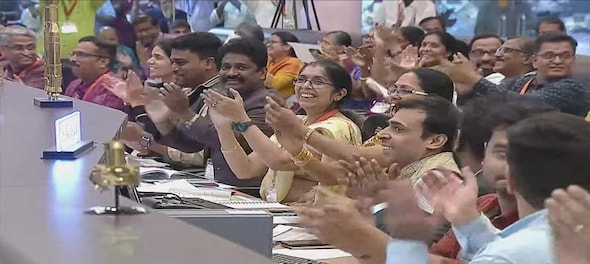
You may have wanted to become an astronaut or scientist (like many) after learning about Rakesh Sharma and Kalpana Chawla, but does that seem too far-fetched a dream now? If you take a close look into the space sector, there are multiple roles that you can aim for apart from being in the hot seats.
After India's Chandrayaan-3 and Aditya-L1 missions, there is renewed interest, especially among youngsters, to make a career in the space sector.
Dhriti Prasanna Mahanta, Vice President, TeamLease Degree Apprenticeship, believes the space sector is a rapidly expanding domain offering a diverse array of career prospects. “While the contributions of scientists remain integral to space exploration, this field encompasses many other alternative vocational avenues,” he told CNBC-TV18.com.
SpaceTech sector funding
According to insights by Tracxn on August 11, 2023, India ranks seventh in terms of funding within the international space tech landscape for the year. From $35 million in funds raised between 2010 and 2019, the sector experienced a meteoric rise in 2020, securing $28 million in funding.
This trend continued with exponential growth, reaching $96 million in 2021 and $112 million in 2022, marking a 17 percent increase from the previous year. The sector has attracted $62 million in funding for 2023, reflecting a 60 percent increase compared to the same period last year.
A Deloitte survey of 60 senior space sector executives in the United States in December 2022, cited an example which states the amount of data being sent to and from space will likely grow to more than 500 exabytes of information from 2020 to 2030 (a 14x increase). In fact, 98 percent of respondents said demand for space data is increasing as it has broader use and significance across end-markets, the report said.
Meanwhile, international space sector staffing and recruitment EVONA has previously said the space sector is one of the fastest growing industries globally and it’s predicted to be worth $3 trillion by 2040.
Job roles in the space sector
Sekhar Garisa, CEO of Foundit (formerly Monster.com), believes the space technology sector is highly competitive but offers impactful opportunities for those who are passionate about space exploration and technology advancement.
Some of the job roles that individuals can pursue are Satellite Engineer, Spacecraft Engineer, Ground Station Engineer, Remote Sensing Scientist, Aerospace Engineer, Space Data Analyst, Astrophysicist, Communication Systems Engineer, Data Scientist, Research Scientist, Space Policy Analyst, Launch Vehicle Engineer, and many more, Garisa said.
Also Read: Meet Ritu Karidhal Srivastava, the ISRO scientist behind success of Chandrayaan-3 mission
Adding to the list, TeamLease Mahanta said prominent specialised roles include Technical Services Engineer, Aircraft and Avionics Technician, Aircraft Airframe and Powerplant Technician, Aerospace CNC Machinist, GIS Analyst, Satellite Technician, Quality Assurance Manager, Mechanical Engineer, Robotics Engineer, Aerospace Engineer, Propulsion Engineer, and Software Developer.
A range of more generalised job roles including electricians, accountants, and administration managers are also present within this domain, he added.
Educational qualifications required for a job in the space sector
Garisa explained that to enter the Indian space technology sector, one typically needs relevant educational qualifications such as degrees in engineering, physics, computer science, mathematics, or related fields.
He said the Indian Space Research Organisation (ISRO) and other space organisations also offer various recruitment programmes, internships, and research opportunities for students and professionals interested in contributing to space technology.
Citing specific examples, TeamLease’s Mahanta explained that Technical Services Engineer and Avionics Technician roles require a degree in aerospace engineering, avionics technology or a related field. Aspiring Aerospace CNC Machinists should pursue training in CNC machining and manufacturing technologies.
“For Satellite Technicians, a background in electrical or electronic engineering is beneficial, along with knowledge of satellite systems,” he said.
He noted that courses and training programmes in these fields are offered by universities, technical colleges and vocational schools.
“In addition to the degrees and certifications, gaining hands-on experience through work-based training programmes like apprenticeships and internships can enhance job prospects in the competitive space industry,” Mahanta said.
He also clarified that if one studied physics, chemistry, and maths (PCM) in their 10+2, they can opt to choose careers in space via on the job training in apprenticeships and internships.
Check out our in-depth Market Coverage, Business News & get real-time Stock Market Updates on CNBC-TV18. Also, Watch our channels CNBC-TV18, CNBC Awaaz and CNBC Bajar Live on-the-go!


2024 Lok Sabha Elections | What does a low voter turnout indicate for NDA and I.N.D.I.A Bloc
Apr 29, 2024 5:48 AM
'Borrowed' leaders: Congress hits out at AAP for not fielding their own candidates in Punjab
Apr 28, 2024 9:53 PM
EC asks AAP to modify election campaign song and Kejriwal's party is miffed
Apr 28, 2024 9:25 PM

